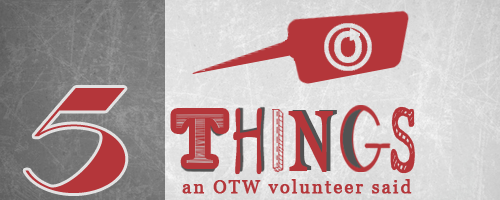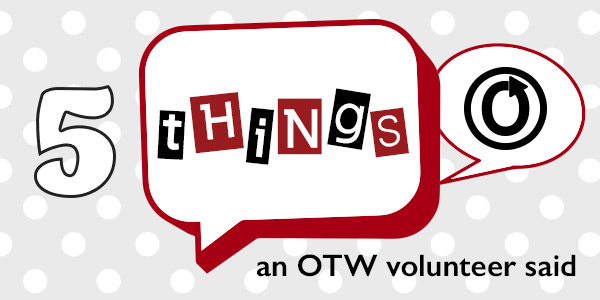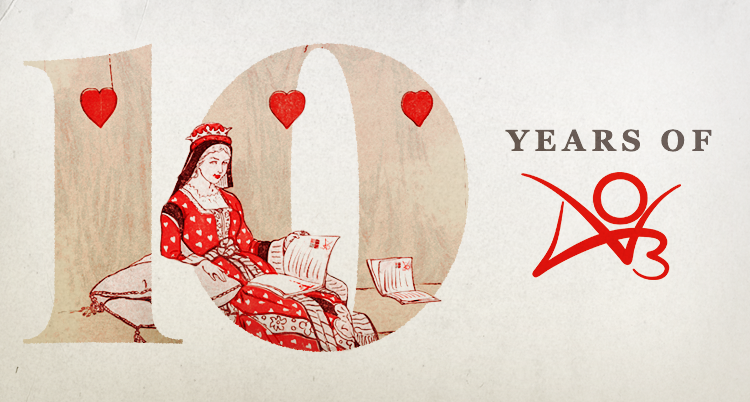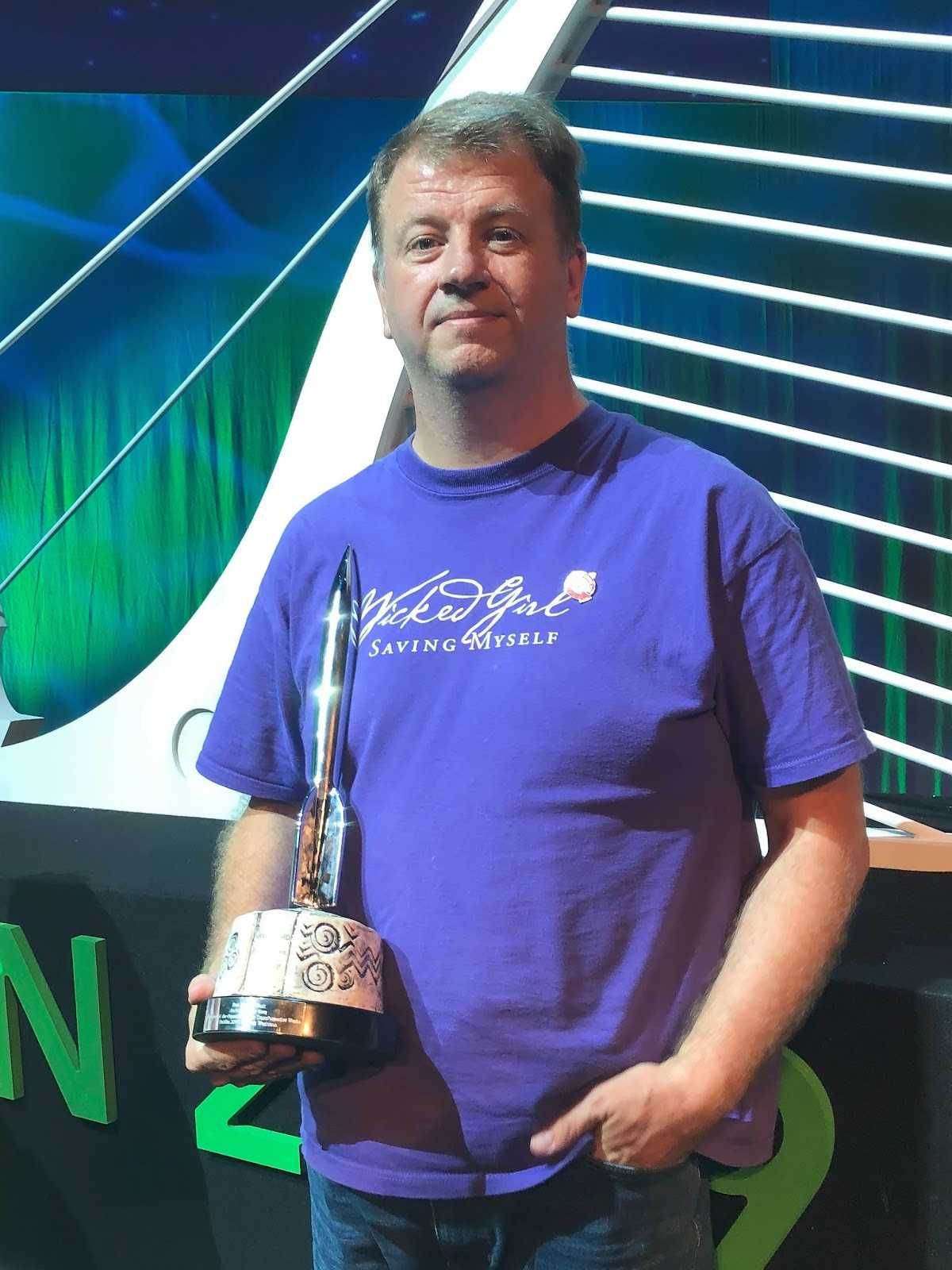
Every month or so the OTW will be doing a Q&A with one of its volunteers about their experiences in the organization. The posts express each volunteer's personal views and do not necessarily reflect the views of the OTW or constitute OTW policy.
As part of our 10th anniversary celebrations, we have a special retrospective Five Things this month. Today's post is with Naomi Novik, one of the founders of the OTW, a past board member, and a current staffer with the Accessibility, Design, & Technology Committee. The following is an interview transcript which has been edited for length and clarity.
What was the first year of the OTW like? What do you remember most from it?
I don't remember the high points as well, I find that over time what I remember are the problems. In the beginning there was a lot of work we had to do to reassure people about what we were trying to do, such as that they weren't going to get into [legal] trouble, that there would be ways to give people control over their stories. The other piece that first year is that some people expected to see something 5 minutes after we formed! You know, where is the Archive? But it all takes time, there were a lot of growing pains you have when you're putting things together from scratch that the OTW has been left with. But my philosophy is to do the thing if you have the momentum, and it's better to have done something that was not perfect than to not have anything done at all.
There were certain ways in which a sustainable organization doesn't work on passion, at the same time that you want to be able to harness passion. I think we were struggling a bit with how to get an organization running but at the same time have it grow. A lot of the details are gone for me now -- I have a terrible memory for this sort of thing because once something is no longer my problem, I forget about it, it's just gone.
One example is figuring out Communications and what it was going to be like [for the OTW and as a committee]. [The early volunteers] were all on LiveJournal, and so regarding communications I thought that it would be just the newsletters we have, and then people from the organization posting on their journals and talking to other fans on an individual level. And it didn't work very well, and I wasn't involved myself, but I remember frustration that we weren't being very successful at doing what we wanted to do there.
I was more involved on the technical level, which we had plenty of disagreements about too. Because the question was do you design it first, to have everything the way you want it, and then you build it or do you just start building? And I feel very very strongly that we ended up doing it the right way. We really did just dive in and start building. Overall, I'm quite happy with the success of that strategy, and then later, we know it's imperfect and there's things it doesn't do, so that unfortunately you haven't served everyone as well as you could have. It's a trade-off to having an archive.
I do think, fundamentally, it was the right call, and we are not, by far, the first organization that had to make that call. There are many different ways to make that call and we could have done it in a better way. Now the cost of that strategy has to be paid over a long time. But what matters most to me is that we made something. And the work is being done to get it to a sustainable place. At the beginning there was a very propulsive sort of drive to establish something and to get it running.
What do you see as the major turning points of the OTW during its ten years?
We had a huge advantage at the beginning, which is that we started with a small group of people who mostly all knew one another. Me, [current OTW Legal staffer] Rebecca Tushnet and [current Transformative Works & Cultures staffer] Francesca Coppa knew each other, and the other first Board members were in relatively close geographical proximity to one another, so we could get together face to face and discuss things. That was a big help. But we also had enormous expertise in the early group -- legal, academic, pro writing, technical experts. The people on the first board were the lynch pins of their respective committees. So it was a small group that could work together closely and develop things quickly in their own areas.
For a while in the middle of the OTW's growth we fell away from that. Being on the Board is a tough job and it takes an enormous amount of time to do the work well. I have done it well and have also done it poorly. It's not entirely, but is largely, based on how much time you have to offer, as well as the people you work with, and whether you can communicate with them effectively and whether there's a level of personal trust among you.
I feel there was a terrible low point that we went through. There was a middle wave; there's been research done on this process among non-profits that shows that what the OTW went through is a common pattern. There is a visionary founder, or team of founders, who bite off much more than they can do. That approach leaves a lot of loose ends. The people who are then recruited and pulled in because of the vision that the founders established see the problems with what was done or with what is happening, but they feel frustrated because they may not have the access to the founders or to ways of solving the problem. So then things turn antagonistic on either a personal or organizational level. So the OTW then had lots of people running for the Board being against what was happening to the Board.
So while things aren't going well and the Board isn't doing everything great, at the same time the people on the Board know a lot about what's going on in the organization because there have already been discussions and arguments that led up to that point, they've been there, and know the reasons for why things are happening. But there's no trust anymore and the Board as a group has gotten dysfunctional. And we have had several dysfunctional Boards.
Then you have the third wave who are happy doing their thing within the OTW and don't necessarily want to be on the Board. But they've seen the problems, they've come up in the organization and have seen what is going on at the top. And even though they'd rather just be able to keep doing the work that they've been doing, they feel they have to step up and fix this situation we've found ourselves in. That's the kind of Board we have now, and that's a good place. The OTW got through those growing pains, which is important because there are a lot of organizations who don't make it through that period, through those transitions.
In the beginning the contrast was, we had lots of disagreements but it was a foundation when everyone knew each other and respected each other's skills and knew of one another before ending up on the Board. That can be good but it also creates insularity. Those first few years were about just vrooom -- anything you wanted to try, you just tried. There wasn't anything that stopped you. There was nothing there yet so you just created something.
So in the beginning you didn't have people already doing things a certain way that then would all have to be changed -- you can't do that to people and disrupt their work and processes in that way. Especially on the coding side, that's an enormously creative period in the beginning where you're just creating. And in general, many people like to build new things and do not like to maintain old things, technology-wise. So at the beginning it's much easier. We all got our hands dirty. None of us had ever worked on anything the scale of what the OTW is now and we were just figuring it all out. For some people it is stressful having to start something, but for others it also is to maintain and grow it.
During your time with the OTW, what have you personally achieved that you feel the most proud of?
The Archive of Our Own is there, just, it exists. On a meta level, when I first made the post about building an archive, I wasn't thinking of it as something I would do. I even said it was something we needed and if someone else would do it then I would help them. But then I saw that no one was volunteering, and I had a moment, I remember this moment, knowing that setting this project in motion would be an enormous time sink, and an emotional sink, and that it would have opportunity costs for the rest of my life. But I did it anyway.
That original discussion generated a certain momentum, and we needed to build on it right away. There's one moment when you can take an idea to the table, and if you miss it, it's going to collapse, it's not going to be a thing at all. At the time I made that post I did it because I was mad and I believed it, I believed we had to do something. It's that whole cliche 'You have to be the change you want to see in the world.' And so I went to Rebecca and Francesca and said 'we're going to do it, but I can't do this without you.' And they said 'alright, we're in.' We'd had conversations before about the problems we wanted the OTW to address and this was the time to do something.
What do you see as the role of the OTW now and do you think that's changed since it began? How might it change in the next 10 years?
The #1 thing that I feel like the OTW has now that it didn't at the very beginning was the role of maintaining things, such as keeping the AO3 up and functioning. And now the Archive, and Fanlore too, but Fanlore is much easier to keep up. It's not easier to grow it, but just to keep it from falling down it's easier. Even the AO3 is hard to grow over the next 10 years just because you need to bring it up to a modern technical level. There should be discussions going on, and I expect there are, about version 2.0 of the Archive. But the AO3 should not look the same 10 years from now, and we need to start thinking about that plan [of how to get there] now rather than later.
We took a responsibility on and I know that -- even during the darkest moments of the Board where I literally thought that the entire tech staff would quit and there would be no one to run AO3 -- that what kept people on [as volunteers] even though there wasn't any kind of good resolution to the problems, it was the inertia of not wanting to drop the ball. There can come a time where there can be too high a personal cost in continuing to work on our projects, but if it requires me [personally] to keep working on it then it's not going to survive anyway. I could not be the one responsible at that stage of my life to continue the maintenance and development of what we had started. I had a small child, my life was changing. And I actually had tried to have conversations with the Board, which was difficult, that if you don't trust the staff to know what to do and to have the room to make those things happen then the project isn't going to survive. There's just a few people keeping it up, and there still are only a few people doing that work, but now there are contractors involved to help move us forward and a process for making the Archive more maintainable.
We all need to gracefully agree and also gracefully fail. And there can be a day when the lights don't come on. There could be a day when we can't afford to keep it running but we keep the stories available for download and provide the data so that someone else can take it on. It's the same thing that Open Doors is trying to save us from, that there are sites that just shut their doors, bye, all your work's gone. [The website] iMeem did that to [fans who were] vidding. Just one day, oh we're not going to host vids anymore. I feel very strongly that we have an obligation not to do that, that's the mission, that the #1 thing the OTW has to do. And I feel that it's happening [that we're keeping things going and maintaing them] so I'm happy with that.
I also feel that legally we're in a better place than we were which is great, and I'm really proud of everything that the Legal Advocacy team has accomplished. It's been amazing to see their victories. I feel like the OTW has done a good job of preserving things too through Open Doors, that's something I'd like to see more focus on, preservation work. But the major thing to work on is also the next generation. Fandom is much larger now than it used to be so we don't need to get everybody, to have the OTW be something to every fan out there. But you do need to be in a place where the kids are at, there's not enough engagement with Wattpad for example. So I think we have people come to the Archive and want and expect things of it, and then go away without quite understanding what it's supposed to be.
One thing I don't want the OTW to do is to try and become hip and trendy and reinvent ourselves in order to try and do that. We want to be the library, the boring place but the one that everyone knows about, and it's there if you need it.
What has been the most fun thing to you about volunteering for the OTW?
Building the AO3. I love coding, I think it's enormously fun, just building and coding something. I love that, that's the best.
Now that one of our founders has said five things about what they've done, it’s your turn to add one more thing! How long have you known about the OTW? Do you use the different projects? How long have you been in fandom?
You can also check out earlier Five Things posts by some of our other volunteers.
The Organization for Transformative Works is the non-profit parent organization of multiple projects including Archive of Our Own, Fanlore, Open Doors, Transformative Works and Cultures, and OTW Legal Advocacy. We are a fan run, entirely donor-supported organization staffed by volunteers. Find out more about us on our website.





